Ripple's Legal Victory Over SEC Establishes XRP's Non-Security Status
Ripple triumphs in court against the SEC, affirming XRP's status as a non-security and reshaping crypto regulation.
 Kikyo
Kikyo
The US presidential election on November 5 will be a confrontation between the two major camps and groups of new and old politics. With Trump's participation, is this a replay of 2016 and 2020? To a certain extent, yes, because these are all populist right-wing governments challenging Washington's political elites; but to a certain extent, it is not at all, for two simple reasons: First, four years ago, Trump did not have the support of Musk, RFK (Robert Kennedy Jr.), or anti-government independent voices such as Joe Rogan ("third force"). Second, eight years ago, Trump "accidentally" came to power with the support of middle and lower-class white people and walked into the White House. Most of the people appointed were politicians and bureaucrats from old Washington ("deep state"), and they were "managed upward" by these people. A large part of this group has already drawn a line with Trump, publicly opposed Trump, and switched to Harris' camp. In addition, until the 2021 Congressional riots, the Republican Party had not yet completely "aligned" with Trump/MAGA, but by 2024, the alignment has been completed. The Republican Party is basically the Trump/MAGA Party.
So, in the past three years, American politics has undergone new adjustments, alignments, and team formations, and has undergone a great "political reorganization" (Great Realignment). The confrontation between the two parties we are seeing now is the situation after the reorganization is completed.
The defending party is the Democratic Party, and the attacking party is Trump. You can imagine it visually. If you can't imagine it, then look at the picture below:
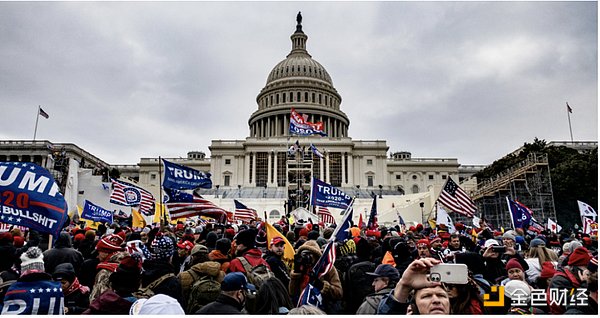
The only difference is that in 2021, hundreds or thousands of people rioted in Congress; in 2024, as of now, it is still in the form of an election.
Below, let's compare the two camps. 1. Defenders: Democratic Party Harris is the representative on the surface, and it doesn't matter who else represents her. It's appropriate for the Trump camp to call Harris a puppet and a marionette. If Harris really wins the election, this will be even more evident.
1) Sharp knife force
First, let’s look at the Democratic Party’s “planes, tanks, and cannons”
The first group: large enterprises, big capital (finance)
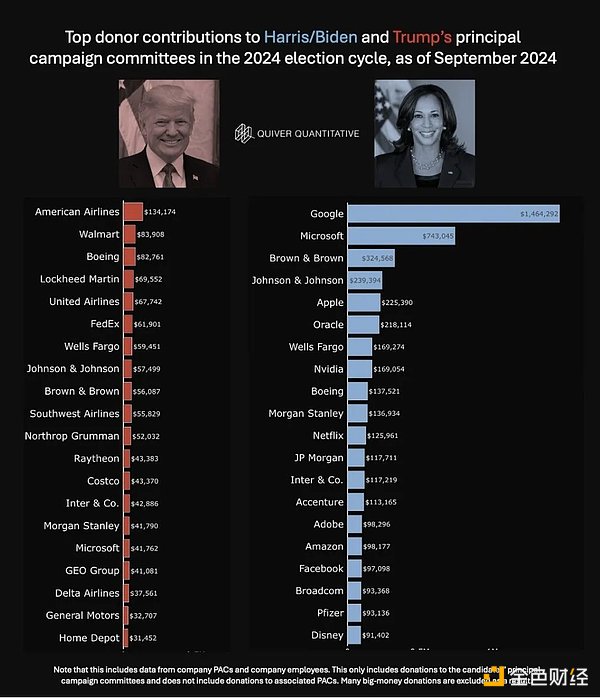
For this part, let me say a few more words. Which big companies and institutions are they? They include large technology companies (Microsoft, Apple, Facebook, Google, etc.), large pharmaceutical companies, financial institutions and capital, military industrial groups, media and entertainment groups, etc. These companies are all beneficiaries of the free market economy. Some people ask, isn't it said that the Republican Party supports low taxes and deregulation? Isn't it said that the Republican Party is the party that represents the interest groups of large companies and capital? How did it become the Democratic Party? This is because, first, the benefits they can get in the political and economic order of the Democratic Party are far greater than what the Republican Party can give. For example, Apple does not have to consider "revitalizing manufacturing" in the United States, and can freely invest and build supply chains around the world. For pharmaceutical companies, they can maintain regulatory measures that are beneficial to them by influencing politicians; for military industrial companies, the military and diplomatic policies of the Democratic Party can give them more military income. As for taxation, it is the least problem. Big companies can avoid taxes in a dazzling way. And by deeply integrating with Washington politicians (including Democrats and Republicans), they can always get what they want. Some companies can even hire illegal immigrants to reduce costs.
Of course, in addition to pure commercial interests, there is another reason, that is, the founders and executives of many companies believe in democracy, mainstream liberals, and the values and philosophy of the left.
Therefore, these companies are not "betting on both sides", they have a clear tendency, that is, supporting the Democratic Party. It can be said that in today's American political landscape, the Democratic Party is the party that represents the interests of big companies and big capital. The second group: the “deep state”/the Machine/the Swamp. The so-called “deep state” refers to the huge bureaucratic system and the various groups and industries associated with it. In the middle are professional politicians, politically appointed officials, and middle and upper-level bureaucrats. On the periphery are various think tanks/research institutions, lobbying groups, political associations, and on the outermost are companies and individuals with interests. The “deep state” has a strong way of thinking, inertia, and vested interests. It is best at guiding and restraining outside elected politicians in various fields. Many people used by Trump in his first term belonged to the “deep state”. Later, many of them parted ways with Trump and openly opposed him in this election (such as Trump’s former White House Chief of Staff John Kelly). These people are senior officials and have a certain influence on society.
There is a trend of thought on the American right wing (represented by a Jew named Curtis Yarvin) that believes that the power of the president should be greatly concentrated and strengthened, so that the president has the same power as a corporate CEO and is not bound by procedures and power checks and balances. For the president, in addition to the power checks and balances, a big challenge comes from the bureaucracy. If power is to be concentrated and execution is to be improved, it is necessary to "go all the way to the bottom" and replace all bureaucrats above the middle level in federal government agencies with their own people. Trump and JD Vance are both affected by this trend of thought. If they make a comeback, they will definitely find ways to reduce their dependence on the "deep state."
The Third Group: Mainstream Media (TV, newspapers, magazines)
Except for Fox, almost all mainstream media in the United States are politically biased towards the Democratic Party, such as CNN, ABC, CBS, MSNBC, The New York Times, The Washington Post, Bloomberg... The main media in other Western countries (from the BBC in the UK to the Mirror in Germany) are also liberal and politically biased towards the Democratic Party. (Only the Wall Street Journal is relatively neutral this time, because they really don't like Harris).
Why do mainstream media lean towards the Democratic Party? Because they are all liberals, and their values are the same as the Democrats. (You can imagine this picture: a group of liberal arts students who believe in left-wing idealism on a university campus). The one-sidedness of the mainstream media has resulted in two results. One is that the Democrats have absolute voice and dominance in traditional media. Another result is that because the mainstream media is one-sided towards the Democrats, there is a serious bias in reporting, but half of the people support the Republicans, which ultimately leads to a decline in the credibility of the media. More and more American people no longer believe in the mainstream media, believing that they are all "fake news", and turn to social platforms and online celebrity self-media to obtain information.
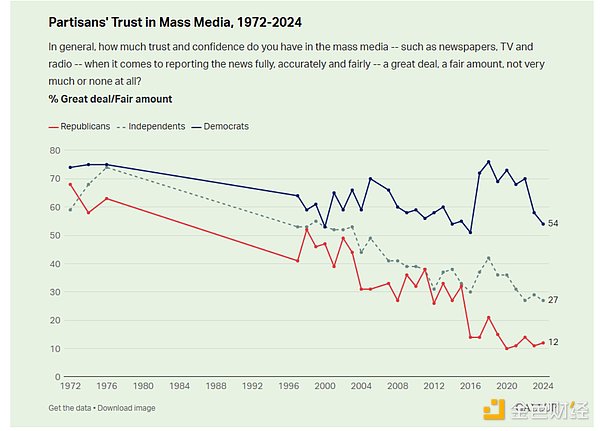
(Figure: Only 12% of Republicans and 27% of independents trust the mainstream media. The trust level has been declining since the Internet era, and it has dropped sharply in the past decade or so)
The fourth group: entertainment industry
The American entertainment industry (Hollywood, pop music, Broadway) and even the broader cultural industry support the Democratic Party. In this election, numerous celebrities (Taylor Swift, Beyoncé, Jennifer Lopez, Usher, Bruce Springsteen, etc.) have come out to support Harris in a high-profile manner. These people have a driving force for fans. Those who support the Democratic Party include not only celebrities on stage, but also creators, investors, managers, practitioners, etc. in the entertainment industry. The reason why the entertainment industry supports the Democratic Party is that the cultural values of practitioners are highly consistent with the Democratic Party. These people have a high level of education and most of them live in places with the strongest liberal atmosphere, such as California or New York. Looking back, from Hollywood, Broadway to pop music, the entire entertainment industry has traditionally opposed conservatism, advocating pluralism, diversity, free expression, and resistance to censorship. Many people no longer like to watch Hollywood because they feel that there are too many "woke" politically correct things now. In short, the American entertainment industry is the propaganda base of the Democratic Party, helping the Democratic Party to promote and instill liberal ideas to the whole society.
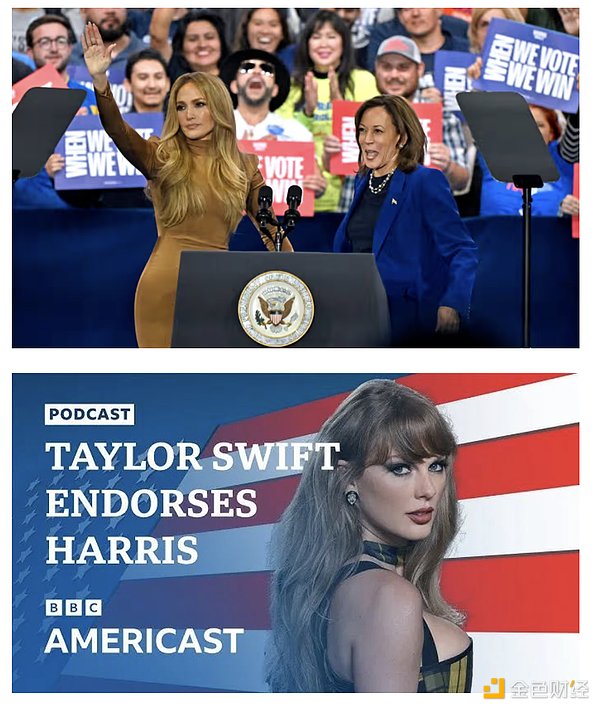

Fifth Group: Intellectuals, Academics, and Ivory Towers
American universities are completely controlled by liberals/liberalism/progressivism/leftists. They are the ideological and ideological strongholds of the Democratic Party, spreading liberal ideas to the younger generation and even society. Most professors are liberals and support the Democratic Party politically; the humanities are completely one-sided: from topic selection, methodology, to conclusions, they are all influenced by liberal/leftist ideas. With such an environment, it is difficult for conservative intellectuals to survive in the ivory tower, and they choose to retreat to think tanks/research institutions in society.
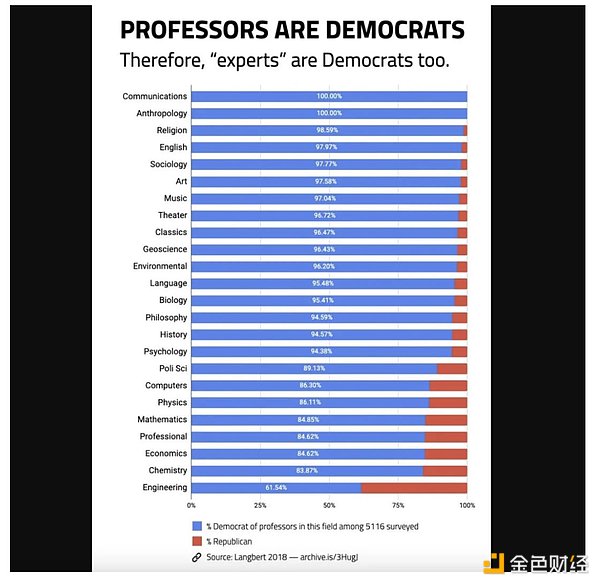
It can be seen that the above groups - big enterprises and big capital, elite bureaucrats, mainstream media, entertainment industry, academic and intellectual circles, together, are actually the elite ruling group in the United States. They control the superstructure of the country, firmly grasp the mainstream ideology through education and propaganda, and at the same time control the country's most important economic power and resources. 2) Grassroots people (providing population base): If big companies, big capital and mainstream media are "planes, tanks and cannons", the grassroots people are the "infantry". The Democratic Party's iron plate, in addition to the big city elites who live in big cities and are influenced by left-wing ideas/progressive ideas/liberal ideas, is mainly composed of various vulnerable groups that have been "recruited" in history, including: - Various ethnic minorities, from blacks, Latinos, Asians to Jews - Women (compared to men, women as a whole are a vulnerable group) - LGBTQ (a vulnerable group discriminated against in terms of sexual orientation) left;">——Trade unions (industrial workers, a disadvantaged group compared to the capitalists)
——Environmentalists
In addition, there are a large number of new forces - the younger generation (post-95s and post-00s) who grew up under the influence of liberal/progressive thought. These people have been surrounded by left-wing ideas such as pluralism and progressivism since childhood.
In addition to American citizens, the Democratic Party has a huge potential force to be transformed: illegal immigrants (mainly Latinos). Once these people obtain citizenship, they are likely to become the Democratic Party's base. On the one hand, the Democratic Party is working hard to provide a path to citizenship for illegal immigrants, and on the other hand, it is doing everything possible to lower the voting threshold. 3) The “defenders’” ideology/values: In the United States: a) Culturally: Promote liberalism, progressivism, pluralism, and the left wing. b) Economically: Add some elements of progressivism/socialism to the “base”/platform of capitalism to eliminate the problem of wealth disparity caused by the barbaric growth of big companies and big capital. For example, raising the minimum wage; supporting trade unions; improving social welfare security; increasing supervision of enterprises and capital to a certain extent, etc.
Internationally:
Apart from New Silicon Valley, are there any other groups on the “attacking side”? The cryptocurrency community? Joe Rogan? Some financial tycoons (Bill Ackman)? No. These are just individuals at best, not a system. In contrast, the “defending side” Democrats are truly “groups”: the media, academia, bureaucracy, entertainment industry, big companies and big capital—these groups are an entire system that overwhelmingly supports the Democratic Party. Trump’s side only has a few minorities, some individuals, not a scale or a system. 2) Grassroots people (providing population base) MAGA’s basic base is lower-middle class white people: “rednecks,” “white trash,” and “hillbillys.” Characteristics of these people: - Low education level, usually high school diploma or below - Includes all kinds of industries, from industrial workers, truck drivers to front-line law enforcement officers - Many live in suburbs or countryside in the United States - Feel abandoned by the Democratic Party (The Democratic Party is the party of elites + people of color + LGBTQ and hippies) - Facing economic difficulties - Feel that white Americans’ culture, values and identity are threatened by people of color and left-wing ideas, and are heading towards racial extinction Vice President JD Vance wrote a book called "Hillbilly Elegy." His original family is a portrait of the MAGA base.
In addition, MAGA's base also includes religious evangelical Christians who have been recruited by the Republican Party in history, many of whom live in southern states. They have considerable intersections with the middle and lower-class whites above.
In addition, the MAGA camp also includes many single-issue voters who believe that only Trump can provide the policies they want in specific areas:
There are many more examples like this.
Adding up the above groups, you will find that Trump's "planes, cannons and tanks" only has Musk. After removing Musk, there are basically only ordinary people left: Compared with the Democratic camp of the elite ruling group, the MAGA side is the "ruled group" of the United States (of course, they are only part of the ruled group and do not represent everyone). These people do not recognize the current situation and direction of the United States, and are worried about their own well-being and the future of the country. However, due to the lack of political representation, they are politically marginalized and have no voice; these people lack resource support in all key areas (such as business, capital, media, intellectuals, culture, government, etc.). In the eyes of the "defenders", the "attackers" are a group of "mobs", a group of anti-intellectual populists who are misled by a bad guy. So Hillary called them a group of hateful people; Biden called them "garbage" (not a "slip of the tongue", but accidentally said it). Trump is the only hope for these people. Under the leadership of Trump and Musk, they launched an attack on the elite ruling group in the United States, aiming to change the political, economic and cultural model of the United States.
The “attackers” are the American people (half of the U.S. population), and the “defenders” are the American elite ruling group, which also controls half of the U.S. population. This is the most fundamental nature of the 2024 U.S. presidential election.
3) The “attackers’” values:
In the United States:
a) Economically: “marketism”, low taxes, deregulation, small government, belief in “trickle-down economics”
Internationally:
a) Economically: Trade protectionism, anti-globalization. Build a high wall to keep foreign products out, and force companies and capital to return to the United States.
b) Politically:Isolationism. If you can stay out of foreign affairs, don't get involved, and don't be the "international police". This attitude actually means that the United States will no longer strongly maintain the international order led by the United States. The core logic of MAGA is that the United States has declined too much in recent years, and the domestic people are complaining. They no longer support the government ("deep state") to make trouble abroad, and hope to return to the development of the domestic economy.
4) The main shortcomings and "burdens" of the "attacking side". The biggest "burden" of the attacking side is the abortion issue, which Trump, JD Vance, and Musk don't care about. This issue is on the table because the evangelical Christians in the MAGA base care about it, but the vast majority of Americans actually support abortion rights (especially women). Anti-abortion is unpopular and is a "fan-losing" issue - especially when Trump is competing with a female candidate, which is equivalent to further helping the other party to win over female voters. 5) The narrative of the "offensive side" in this election is also "saving America". Everyone is talking about "saving America", but the difference is that the "defending side" Democrats are talking about saving America, which means saving "American democracy", while Trump/MAGA's "saving America" refers to saving America's industry, international competitiveness, culture, identity, etc. The "saving America" mentioned by both sides is not the same thing. Which issue is more important? Behind this is actually a class issue. There was a poll before, which found that the attitude of the American people towards sending troops overseas is related to income. The higher the income, the more supportive they are of sending troops overseas; the lower the income, the more opposed they are. Why do people with high incomes support sending troops overseas? First, because they are well-educated and have lofty ambitions; second, sending troops is not sending their children (this is the case of the Democratic Party). Similarly, the attitude towards "American democracy" is also related to your economic situation. If you don't have a job, a house, or food, what do you worry about "American democracy"? It's none of your business. On the other hand, if you have no worries about food and clothing, and never have to worry about firewood, rice, oil, salt, vinegar, and oil (in the words of American politicians, "whether there is bread in the kitchen for the next few days" and "when will the next check arrive"), then of course you can defend American democracy with all your heart. As the Chinese saying goes, it is easy to talk without any pain in the waist.
The election competition between Trump and Harris/Democratic camp is essentially a war between the half of the American people as the ruled group and the elite ruling group. As the "offensive" party, Trump's camp is actually launching a "revolution" around the future direction of the United States, but this "revolution" is not gunpowdered, but this "revolution" is temporarily still carried out in the form of elections.
From this, we can also make an observation: that is, the political elections in the United States are a very powerful mechanism to resolve internal contradictions. Of course, it is also because the United States is a large country with a large population, and all confrontations are local. If it is a small country with a few million people, there is no need to use elections to solve the problem, but a direct revolution, coup, or civil war.
The final act of the US election is about to begin. Please continue to watch the show.
Ripple triumphs in court against the SEC, affirming XRP's status as a non-security and reshaping crypto regulation.
 Kikyo
KikyoLedger commits to reimbursing users post-exploit and enhancing security by discontinuing blind signing, shifting towards Clear Signing standards.
 Brian
BrianRecent claims of account seizures and lack of transparency at MEXC have raised significant concerns among users, echoing the cautionary tale of FTX's downfall.
 Alex
AlexNigeria's Central Bank lifts the ban on bank-facilitated crypto transactions, signaling a significant policy shift and renewed market potential.
 Kikyo
KikyoCardano founder Hoskinson humorously engages with teen hacker Kurtaj’s cyber feats, highlighting wider cybersecurity and AI scam concerns.
 Alex
AlexIlluvium's 2024 roadmap promises to revolutionize blockchain gaming with a focus on advanced technology, a public beta launch, and setting new industry standards.
 Brian
BrianMEXC, amidst claims of freezing assets and CEO’s social media mystery, denies allegations and asserts normal operations.
 Alex
AlexJpeggler's investment in POPCAT secures its future, enhancing stability and trust within the Solana community.
 Kikyo
KikyoBitMEX co-founder Arthur Hayes warns of the existential risks to Bitcoin from a potential U.S. spot Bitcoin ETF and TradFi involvement.
 Kikyo
KikyoBG, unlicensed by VARA, potentially breached regulations by issuing and marketing ISLM tokens in Dubai without approval, requiring immediate cessation of activities and obtaining necessary VARA licenses.
 Alex
Alex